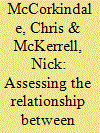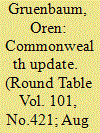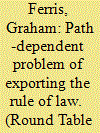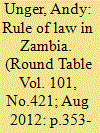| Srl | Item |
| 1 |
ID:
114762


|
|
|
|
|
| Publication |
2012.
|
| Summary/Abstract |
In this article, the authors will consider a very narrow yet spectacularly important aspect of the rule of law: its place in a constitution-the constitution of the United Kingdom-in which supremacy rests not with the constitution as a document to be interpreted by a constitutional court, but with the legislature itself. While traditionally the supremacy of the Crown in Parliament has meant that British courts have had no right to set aside even the most oppressive legislation, recent extra-judicial writings and obiter dicta in case law have been indicative of a shift in the judicial mood. In light of these developments, the paper will ask: Where does the relationship between the supremacy of the Crown in Parliament and the rule of law stand now? Where might that trajectory take us? And what might be done to reconcile the two?
|
|
|
|
|
|
|
|
|
|
|
|
|
|
|
|
| 2 |
ID:
114759


|
|
|
|
|
| Publication |
2012.
|
| Summary/Abstract |
The annual Failed States Index features several leading nations of the Commonwealth, including Nigeria, Uganda, Kenya and, of greatest concern, Pakistan. A death threat against a journalist by Sri Lanka's defence minister reveals that the government appears intent on cowing the press at home and ignoring criticism from abroad, with ominous implications for the country. An unseemly public row between members of Nelson Mandela's family has parallels with a power struggle within South Africa's ruling African National Congress.
|
|
|
|
|
|
|
|
|
|
|
|
|
|
|
|
| 3 |
ID:
114764


|
|
|
|
|
| Publication |
2012.
|
| Summary/Abstract |
This article examines three indicators of a functioning rule of law state. First, that the executive operates through legally constituted channels: that administrative and political actions are constrained and channelled through legal authority. Second, that trial processes are robust: being genuine attempts to decide according to proof and law, rather than returning decisions that it is hoped will placate the powerful. Third, that no individual entities, be they corporations or individuals, be they economically or politically or militarily powerful, are able to act outside the reach of legal remedy. The work of D. C. North helps in understanding how the failure to implement or reform law successfully is predictable if the relevant features of the society that receives legal transplant or legal reform efforts are ignored. Ultimately, reform must involve domestic agents in its design and implementation because their knowledge of the subjunctive worlds of their own societies is a vital component in the reform process.
|
|
|
|
|
|
|
|
|
|
|
|
|
|
|
|
| 4 |
ID:
114761


|
|
|
|
|
| Publication |
2012.
|
| Summary/Abstract |
It may not be possible to define Rule of Law with scientific precision but it cannot be dismissed as an elusive notion or as an unruly horse. Rule of Law is the heritage of all mankind because its underlying rationale is belief in the human rights and human dignity of all individuals everywhere in the world. It needs to be emphasised that there is nothing western or eastern or northern or southern about the concept of Rule of Law. It has a global reach and dimension. Rule of Law symbolises the quest of civilised democratic societies, be they eastern or western, to combine that degree of liberty without which law is tyranny with that degree of law without which liberty becomes licence. It is entrenched in India to the extent that the Rule of Law cannot be abolished even by a constitutional amendment.
|
|
|
|
|
|
|
|
|
|
|
|
|
|
|
|
| 5 |
ID:
114758


|
|
|
| 6 |
ID:
114763


|
|
|
|
|
| Publication |
2012.
|
| Summary/Abstract |
This article discusses the relationship between access to justice and the rule of law, outlines the current financial and operational limitations with regard to full access to justice in Zambia and describes a practical project, undertaken by the Law Association of Zambia and the South London Law Society, supported by London South Bank University, to enhance access to justice in Zambia and thereby strengthen the rule of law. It encourages others, particularly Bars and Law Societies, law firms and University Law Schools, to undertake similar projects in Zambia and across the Commonwealth wherever they may be required.
|
|
|
|
|
|
|
|
|
|
|
|
|
|
|
|
| 7 |
ID:
114760


|
|
|
|
|
| Publication |
2012.
|
| Summary/Abstract |
There are many interpretations of the rule of law. Transforming from a 'thin' to 'thicker' conceptualisation means infusing 'quality' and 'goodness' to the laws of the State. Accordingly, this centres attention on aspects of adherence to international human rights, the focus of this article. Drawing on the literature linking rule of law with human rights, a preliminary evaluation of the extent to which Commonwealth States appear to respect this 'thicker' rule of law will be provided. Reference will be made to a qualitative analysis of the comments and recommendations made to States during the first cycle of universal periodic review by the UN Human Rights Council as well as a number of pre-existing statistical data on specific issues. While the rigour of such an approach may be queried, there can be little doubt that although there is evidence of rule of law compliance within the States, there remains scope for improvement.
|
|
|
|
|
|
|
|
|
|
|
|
|
|
|
|